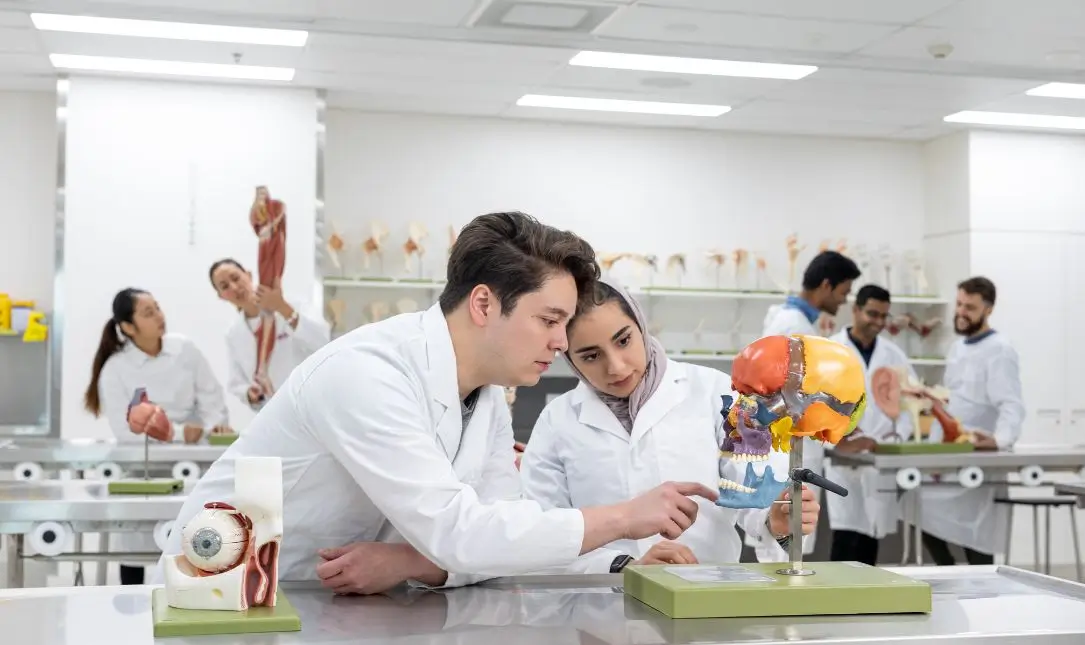
Studying medicine is a noble aspiration for many, a profession demanding immense passion and unwavering dedication. With increasing competition for medical school admissions in local universities, many students are turning to the option of studying abroad. This choice not only helps overcome admission hurdles but also offers a unique educational and cultural experience.
This article aims to provide a comprehensive guide for students aspiring to study medicine abroad, covering the significance of this decision, top study destinations, admission requirements, the application process, and valuable tips to ensure a successful and enriching academic journey.
Why Choose to Study Medicine Abroad?
Several compelling reasons drive students to pursue medical studies abroad, including:
- Global Recognition of Degrees: Many international universities offer globally recognized medical programs, opening vast opportunities for graduates to practice in various countries worldwide.
- Quality Education and Facilities: Leading universities abroad are renowned for providing high-quality medical education, supported by state-of-the-art technology and advanced training facilities, including university hospitals and well-equipped laboratories.
- Cultural Diversity and Personal Experience: Studying abroad offers an invaluable opportunity to immerse oneself in diverse cultural environments, enriching the student's personal experience and broadening their horizons. It also helps develop essential communication and adaptability skills.
- Costs and Scholarships: While tuition fees in some countries can be high, many nations offer medical education at more affordable costs. Additionally, numerous scholarships are available to cover part or all of the tuition and living expenses.
Best Countries to Study Medicine Abroad
The destinations available for medical studies abroad are diverse, varying in terms of educational quality, costs, and admission requirements. Here are some of the top countries favored by students for medical studies:
United Kingdom (UK)
The UK is a popular destination for many international students due to its high-quality medical education and the prestigious reputation of its universities, such as Oxford and Cambridge. However, admission is highly competitive, and tuition fees are high (can reach £60,000 per year for undergraduate students).
UK universities typically require excellent academic grades in high school (especially in science subjects like Biology, Chemistry, Physics, and Mathematics), passing entrance exams like UCAT or BMAT, and English language proficiency (IELTS minimum 7.0).
Germany
Germany offers high-quality medical education in its public universities at low or even no tuition fees for international students. However, most medical programs are taught in German, requiring a high level of proficiency (B2-C1 level).
Admission is highly competitive and regulated by state quotas. Germany provides excellent opportunities for clinical training and research, as well as possibilities for residency and work after graduation.
Canada
Canada is known for its high-quality medical education and advanced research facilities. However, the number of available spots for international students is very limited, and admission is highly competitive.
Most Canadian universities require a bachelor's degree before applying to medical school. Tuition and living costs in Canada are high, but it offers good opportunities for permanent residency and work after graduation.
Other Notable Countries
- Hungary, Poland, Czech Republic, Romania: These countries offer English-taught medical programs with lower tuition fees (ranging from $7,000 to $15,000 USD per year) and are growing in popularity among international students.
- Turkey and Malaysia: They offer affordable private universities and English-taught programs, with multicultural environments and lower living costs.
- Georgia: Has become a popular destination for English-taught MBBS programs with very low tuition fees.
- India: Is one of the cheapest countries for medical studies, with costs around $10,000 USD per year.
- Australia: Offers prestigious universities and high-quality education, but at high costs.
- United States of America: Home to some of the world's most prestigious medical schools, but they are very expensive and often require tests like the MCAT.
- Sweden, Switzerland, and Netherlands: Offer excellent medical programs, but some programs might have language barriers, and costs are relatively high.
Admission Requirements for Studying Medicine Abroad
Admission requirements vary among universities and countries, but there are several core requirements that students typically need to meet:
- Academic Qualifications: Most medical schools require high academic grades in high school, with a particular emphasis on science subjects (Biology, Chemistry, Physics, Mathematics). Some universities may require equivalent qualifications such as UK A-Levels or the International Baccalaureate (IB) diploma.
- Entrance Exams: Certain countries and universities require specific entrance exams. For instance, in the UK, applicants are usually required to take the UCAT (University Clinical Aptitude Test) or BMAT (BioMedical Admissions Test).
- English Language Proficiency: Since many programs are taught in English, demonstrating English language proficiency is essential. This is typically done through tests like IELTS (with a minimum score of 6.5 or 7.0 overall) or TOEFL.
- Motivation Letter (Personal Statement) and Curriculum Vitae (CV): Students must submit a strong motivation letter explaining their reasons for pursuing medicine, relevant experiences (such as volunteering in healthcare), and career goals. A detailed CV outlining academic qualifications, work experience, and achievements is also required.
- Letters of Recommendation: Letters of recommendation are usually requested from teachers or academic advisors who can assess the student's academic abilities and personal qualities.
- Personal Interviews: Interviews are a crucial part of the admission process in many medical schools, where the student's communication skills, passion for medicine, and critical thinking abilities are evaluated.
Application Process and Key Steps
The application process for studying medicine abroad requires careful planning and adherence to specific steps:
- Research and Choose University/Program: Start by thoroughly researching universities and programs that align with your academic qualifications, budget, and career goals. Compare curricula, admission requirements, and university reputations.
- Prepare Required Documents: Gather all necessary application documents, such as academic transcripts, language test scores, motivation letter, CV, and letters of recommendation. Ensure all documents are translated and certified if required.
- Apply via Centralized Systems or Directly: In some countries, like the UK, applications are submitted through a centralized system like UCAS. In others, you might apply directly to the university. Follow the specific guidelines for each university or application system.
- Follow Up on Your Application: After submitting your application, regularly check its status. Universities may request additional documents or schedule interviews. Be prepared to respond promptly to any inquiries.
Costs and Funding
Costs are a crucial factor in the decision to study medicine abroad. These costs typically include:
- Tuition Fees: Tuition fees vary significantly between countries and universities. While some countries (like Germany) offer almost free education, fees in others (like the USA and UK) can amount to tens of thousands of dollars annually.
- Living Expenses: These include accommodation, food, transportation, and personal needs. Living costs vary depending on the city and the student's lifestyle.
- Scholarships: Many scholarships are available for international students pursuing medical studies, offered by governments, universities, or private organizations. It is advisable to research and apply for these scholarships early.
- Part-time Work Opportunities: Some countries allow international students to work part-time during their studies, which can help cover a portion of living expenses.
Visa and Residency
After receiving university admission and securing the necessary funding, obtaining a student visa is a critical step. This process requires advance planning and accuracy in submitting documents:
- Research Student Visa Requirements: Investigate the specific student visa requirements for your chosen country. These typically include an acceptance letter from the university, proof of sufficient financial means to cover study and living expenses, a valid passport, and sometimes health certificates or police clearance certificates.
- Immigration Procedures: Familiarize yourself with the immigration laws of the host country, including rules regarding working during studies, possibilities for extending your stay, and any post-study work opportunities that may be available.
Tips for Students
To make the most of your medical study abroad experience, here are some important tips:
- Thorough Research: Do not rely on a single source of information. Research universities, programs, admission requirements, and costs in several countries thoroughly before making your final decision.
- Early Preparation: Start preparing for the application process at least a year before the intended start date. This includes improving your grades, preparing for language and admission tests, and gathering all required documents.
- Language Skill Development: If the language of instruction is different from your native language, start developing your language skills early. Proficiency in the language will help you integrate academically and socially.
- Interview Preparation: Practice for personal interviews, and think about potential answers to common questions about your motivations, experiences, and career goals.
- Connect with Current Students and Alumni: Try to connect with students currently studying or who have graduated from the programs you are interested in. They can offer valuable advice and share their real-life experiences.
Studying medicine abroad is a journey filled with both challenges and opportunities. It is an investment in the future that opens doors to a rewarding and impactful career.
Through careful planning, thorough preparation, and perseverance, students can achieve their dream of becoming global medical professionals, contributing to the improvement of community health worldwide.
Remember that this experience will not only be about academic learning but will also shape your personality, broaden your horizons, and give you a unique global perspective.
FAQ About Study Medical Abroad
1. Can I work while studying medicine abroad as an international student?
Yes, many countries allow international students to work part-time during their studies. However, the number of hours permitted and the type of work allowed vary by country. It's important to check the specific student visa regulations of your destination country.
2. Will my medical degree from abroad be recognized in my home country?
Recognition depends on your home country's medical council or regulatory body. Before enrolling, it's crucial to confirm whether the university and its program are recognized and accredited by the relevant authorities in your country.
3. How long does it take to complete a medical degree abroad?
The duration of medical programs varies by country. Generally, it takes 5 to 6 years for undergraduate-entry programs (e.g., in the UK or Eastern Europe), while countries like the USA and Canada require a prior bachelor's degree, making the total path around 8 years.






